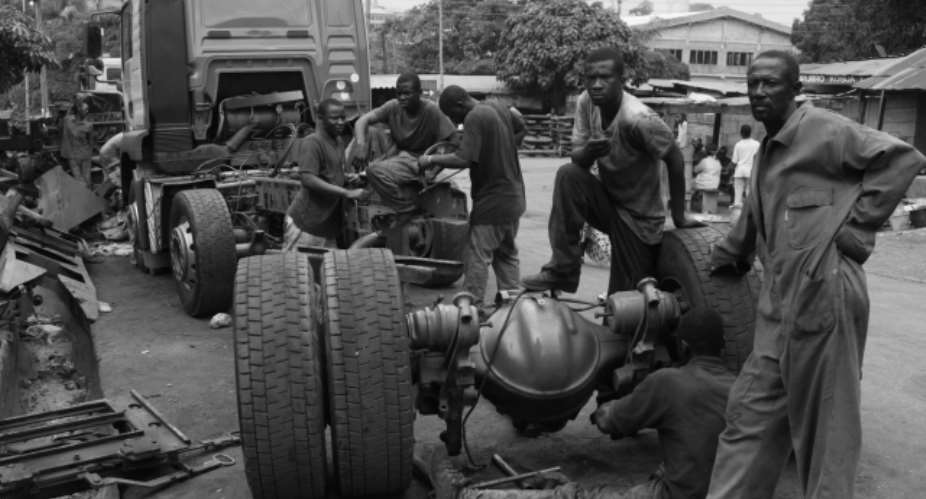There is no reason why Ghana has to continue importing simple tools like spanners, fasteners etc when they can be easily manufactured at Suame Magazine with access to automated systems and machines.
In the 1970s and 1980s, Suame Magazine artisans with the support of the Kwame Nkrumah University of Science and Technology (KNUST) and the government manufactured bolts and nuts for use by trucks to cart cocoa. History and accumulated expertise, as well as the presence of KNUST, favours Suame Magazine for such an investment. The private sector may not necessarily consider such an investment worthwhile and that's where government comes in to catalyze the process for easy access to expertise (foreign and local), machinery and capital to drive the sector.
The auto assembly industry began in 1969 with the Nissan plant, but without a guiding policy the sector fizzled out. The auto industry contributes tremendously to direct and indirect employment and can contribute a chunk of industrial development at its peak hence, there is the need for nurturing of the sector through policies and effective plans that builds capacity in all Tiers of the industry.
The Toyota South Africa plant in Durban, for instance, outsources as much as 40% of over 1,000 components used for manufacturing their popular salon and cross-country vehicles to local firms including artisans. Outsourcing from the auto companies when fully operational, presents an enormous opportunity for Ghanaian artisans and businesses to take advantage and supply a wide range of components from fasteners to upholstery items.
Moreover, this can be maximized and used as an opportunity to build capacity by; creating industrial hubs within the Suame magazine industrial cluster fitted with modern machinery and access to capital. As Tier 3 (repair facilities and component manufacturers) firms and suppliers, artisans and allied businesses can service the multinational auto companies that are lining up to operate in Ghana. So far Toyota, Nissan, VW, Suzuki have all declared intentions and signed Memorandum of Understanding with the Government of Ghana to establish a presence in the country.
Meanwhile, capacity building and skills development need to start before the sector takes off in Ghana and not the other way around as happened in South Africa. Skilled and semi-skilled employment makes up a large size in employment to be generated. At this rate, Suame Magazine artisans desirous of joining the sector will need support to boost their skills.
In view of this, I propose that the government of Ghana enters into a partnership with Toyota which has expressed interest in setting up an assembly plant in Ghana to consider a similar model being implemented in South Africa to build capacity for the industry through the set up of the Centre for Automotive Research and Development at the Kwame Nkrumah University of Science and Technology to undertake the following;
- Collaborate with Toyota South Africa and the Gordon Business School. The focus will be on the emerging automotive industry by providing graduate education in automotive engineering
- Conduct and highlight breakthrough research conducted in world-class labs
- Spur economic development by supporting traditional and emerging technology-driven cluster growth
- Retool the Suame Intermediary Technology Transfer Unit (ITTU), owned by KNUST into an industrial hub fitted with the requite machinery to promote technology and skills transfer
- Serve as a magnet venue for automotive industry events, programs, workshops, and awards
As Ghana's Auto industry evolves, it is imperative to understand the complexities and needs of stakeholders. Setting up plants beginning with Semi-Knocked-Down (SKD) Assembly (where all components are imported to be assembled) and capacity building will take about 2-3 years from the signing of MOU. From SKD-1, we can move to SKD-2 and ultimately to Completely Knocked Down (CKD Assembly), from where a sizable number of components are manufactured locally, hopefully in a decade.
We need to be patient and devolve the emerging sector from poisonous politicking so that the technocrats can work on an effective policy that ensures localization and create the right investment climate for the companies and Ghana to mutually benefit.
About the author:
Yaw Adu-Gyamfi, is an innovation researcher with a focus on the informal sector particularly Suame Magazine where he has worked for over a decade. He can be reached via [email protected] and on +233-24-4480-475 for feedback and comments.





 It’s an abuse of power to arrest ECG officials for performing legitimate duties ...
It’s an abuse of power to arrest ECG officials for performing legitimate duties ...
 Unreasonable Actions of GTEC to Collapse Private Universities, Colleges, Institu...
Unreasonable Actions of GTEC to Collapse Private Universities, Colleges, Institu...
 Corruption makes a lot of people rich, happy; NDC, NPP cannot help us – Okyeame ...
Corruption makes a lot of people rich, happy; NDC, NPP cannot help us – Okyeame ...
 GOIL increases fuel prices again, diesel sells GHC14.80, GHC14.99 per litre of p...
GOIL increases fuel prices again, diesel sells GHC14.80, GHC14.99 per litre of p...
 Bawumia will use Ghana’s gold to stabilize the Cedi if voted as President — Ahia...
Bawumia will use Ghana’s gold to stabilize the Cedi if voted as President — Ahia...
 Arrival of state-of-the-art bullet trains signify Ghana’s journey towards enhanc...
Arrival of state-of-the-art bullet trains signify Ghana’s journey towards enhanc...
 Idea behind Performance Tracker is great but shouldn't be limited to election ye...
Idea behind Performance Tracker is great but shouldn't be limited to election ye...
 Election 2024: Bawumia losing 21.8% of NPP’s 2020 Akan votes — Global InfoAnalyt...
Election 2024: Bawumia losing 21.8% of NPP’s 2020 Akan votes — Global InfoAnalyt...
 People are celebrating their 80th birthday and Ghana owes GHS650 billion; who is...
People are celebrating their 80th birthday and Ghana owes GHS650 billion; who is...
 Court issues arrest warrant for Chinese Iron woman, one other over cantonments l...
Court issues arrest warrant for Chinese Iron woman, one other over cantonments l...
